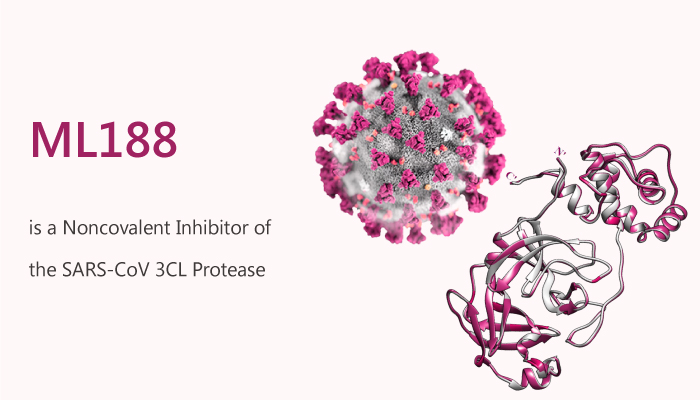Coronaviruses (CoV) are large plus-strand RNA viruses. They cause medical disorders such as the common cold, lower respiratory tract infections, and diarrhea. The SARS-CoV genome encodes a large polyprotein. Two cysteine proteases: 3C-Chymotrypsin-Like protease (3CLpro, or non-structural protein 5, nsp5) and the Papain-Like protease (PLpro), proteolytically process the polyprotein. 3CLpro is essential for proteolytic processing at 11 different cleavage sites within the coronavirus polyprotein. It is thus vital for viral replication. The SARS-CoV 3CLpro has three domains: I, II, and III. Although the autocatalytic mechanism is still being elucidated, it involves an initial dimerization event between two unreleased nsp5s within the polyprotein followed by a series of catalytic steps that liberate a fully active, dimeric enzyme that can then proceed to process the remaining 9 cleavage sites of the polyprotein. ML188 is a selective non-covalent SARS-CoV 3CLpro inhibitor.

ML188 inhibits SARS-CoV 3CLpro with an IC50 of 1.5 μM. It also shows antiviral activity. Moreover, ML188 can effectively inhibit SARS-CoV replication in cell culture. Based upon the structural information, excellent 3CL protease inhibition activity, and SARS-CoV Ubani antiviral activity, ML188 is a first in class probe candidate from the furyl amide series. Probe ML188 is highly selective for 3CLpro versus PLpro, and in a Ricerca lead-profiling screen against 68 discrete GPCRs, ion channels, and transporters. In addition, ML188 yields an antiviral EC50 value ranging from 12.9 to 13.4 μM in mock-infected and SARS-CoV infected cells.
In summary, ML188 is a noncovalent SARS-CoV 3CLpro inhibitor with moderate MW and good enzyme and antiviral inhibitory activity. It provides an excellent starting point for the further design and refinement of 3CLpro inhibitors that act by a noncovalent mechanism of action.
Reference: